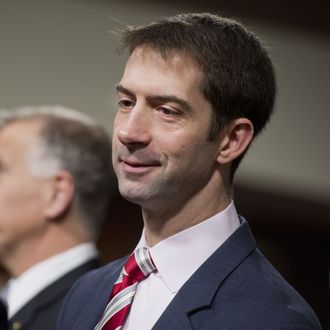
Back in March, well before Republican politicians in their multitudes began making their way into Donald Trump’s camp, often stealthily and sheepishly, U.S. senator Tom Cotton of Arkansas strode right in on the pretext of a meeting to discuss national-security issues with the mogul. Cotton afterward allowed as how he and Trump shared a lot of common ground on a subject like NATO cost-sharing, and immediately made it clear he would support Trump if he won the nomination. For Cotton, there was none of the public hang-wringing so many similarly positioned conservatives undertook, much less the frantic search for a third-party option pursued by his long-time patron William Kristol and his admirer Erick Erickson (who in 2015 called Cotton the “most powerful man in Washington” for his leadership against the Iran nuclear deal).
Now Cotton is in a very comfortable place in the Trump-led GOP. He has no angry or disparaging words to eat, yet can maintain an independent posture as someone offering friendly pressure on Trump to overcome any reluctance to boost defense spending (Cotton’s most obsessive priority) or junk the Iran deal as quickly as possible.
His bonds to Trump World have been strengthened by his latest crusade in the Senate: serving as wingman to Trump’s closest Washington associate, Senator Jeff Sessions of Alabama, in the effort to kill bipartisan criminal-justice-reform legislation. Speaking Thursday at the Hudson Institute, Cotton made headlines by arguing that the U.S. did not have a “mass incarceration” problem, but rather an “under-incarceration problem,” based on the number of crimes that go unsolved or unprosecuted.
This is vintage Tom Cotton, who has both the mien and the worldview of a grim and unforgiving lawgiver right out of the Book of Deuteronomy or Calvin’s Geneva. In a perceptive profile of Cotton (entitled “The Making of a Conservative Superstar”) written during his 2014 Senate campaign, Molly Ball summed up his perspective as follows:
[Cotton has] a harsh, unyielding, judgmental political philosophy, one that makes little allowance for compassion or human weakness. “I don’t think Arkansas needs to bail out the Northeast,” Cotton once said of his vote against the Hurricane Sandy relief bill. He has dismissed the potential for default if the debt ceiling was not raised as a desirable “short-term market correction,” and said food stamps should be cut because too many recipients live high on the hog: “They have steak in their basket, and they have a brand-new iPhone, and they have a brand-new SUV.
This is, after all, the man who first rose to national prominence via an angry letter to the New York Times from Iraq (where he was serving as an infantry officer) suggesting the editors should be imprisoned for leaking information about a Bush administration anti-terrorism program. That Iraq service, of course, is an important part of Cotton’s powerful attraction to GOP movers and shakers: He’s the man with the golden résumé. He emerged from rural Arkansas to graduate from Harvard and Harvard Law School (with an interim year in a prestigious fellowship at the conservative-friendly Claremont Institute) and managed to attract prominent conservative mentors along the way. As Ball puts it:
From the time he was a teenager, Cotton has been nurtured and groomed by conservative institutions—scholars, think tanks, media, and advocacy groups—to be the face of their political crusade.
His most politically valuable move, however, was to abandon a budding profession at a white-shoe law firm to volunteer for infantry duty in the Army, which in short succession led to deployments in Afghanistan and Iraq — and the fateful letter to the Times. After his discharge in 2009, Cotton briefly signed on for work with the elite consulting firm McKinsey & Company, but was soon drawn into politics when an Arkansas congressional seat opened up.
The legend of Tom Cotton was further enhanced by his 2014 Senate race against wily Democratic incumbent Mark Pryor, which turned into a 17-point Republican blowout.
Given his background and trajectory, it’s not surprising that talk of Cotton as a future president followed him even before his Senate win. Both neocons and “constitutional conservatives” — often at odds with each other — absolutely adore him. And unlike that other neocon darling Marco Rubio, or that other constitutional-conservative champion Ted Cruz, Cotton doesn’t have to live down a failed presidential bid or the various bruised feelings inevitably incurred. Indeed, at 39, Cotton could arguably make the 44-year-old Floridian and the 45-year-old Texan look like yesterday’s news in a future contest.
Though he seems to have successfully navigated the challenge of coming to grips with Trump, there’s a chance Cotton could yet face a momentous decision with respect to the Donald: His name is occasionally showing up on Trump veep lists. In a recent interview, the Arkansan did nothing to rule it out. This could just be a head fake, another gesture of friendliness toward Trump so that he cannot be blamed for treachery if the tycoon’s general-election campaign crashes and burns. Or perhaps this golden boy sees an opening for a leap to the very top of the GOP career ladder, which he has every reason to consider his destiny. It’s a separate question whether actual voters outside Arkansas share their approval of this dour, self-consciously elite figure, who has identified himself with the hardest-edged conservative positions on both foreign and domestic policy. It may depend on whether a majority of Republican voters — or Americans generally — crave a good tongue-lashing and a high risk of war and recession.






























